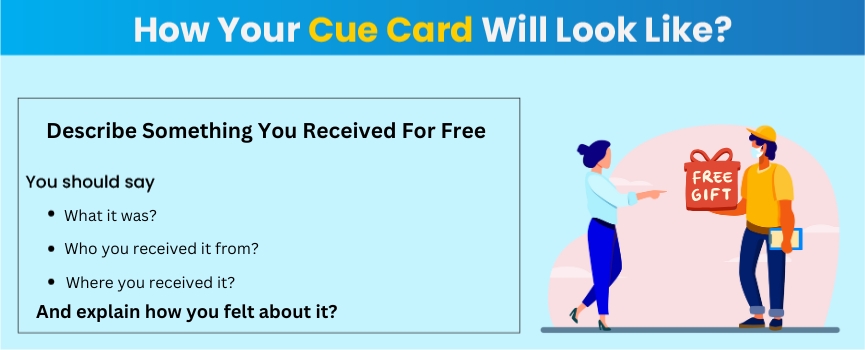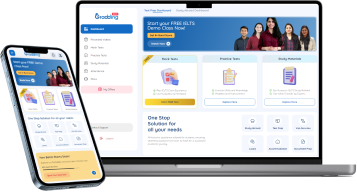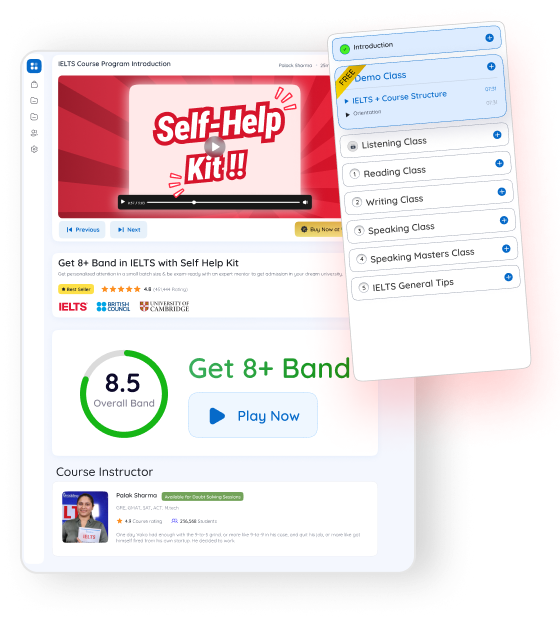Describe Something You Received For Free - IELTS Cue Card
Last updated: Oct 3, 2025Essentially, the topics in the IELTS speaking part 2 are chosen from a wide range of everyday themes to fairly test every test-taker's English speaking skills. These cue card topics showcase how the real-world conversation in an academic setting works. And one such topic is “Describe Something You Received For Free”, which will test how well you can describe a personal experience, explain the circumstances around it, and express your feelings about receiving something without any cost. This can get difficult for some because it needs you to provide enough detail and emotion about something that might seem ordinary or insignificant. But don’t worry, below are three different samples to help you!

Table of Contents
Introduction to IELTS Cue Cards
The IELTS speaking section is divided into three parts: introduction & interview, long turn, aka IELTS cue cards, and a two-way discussion. Besides the first part, the other two are interconnected and build on each other.
In the IELTS cue card, you will be given a task card with a topic written on it, along with a few pointers. Using these pointers, you have to talk continuously about the topic for 1-2 minutes until the examiner stops you when the time is up. In total, you will get 3-4 minutes to complete this task, where one minute is for you to prepare.
The topic “Describe Something You Received For Free” will test how well you can narrate an event, use descriptive language, and express personal opinions naturally.
How to Answer the Cue Card?
The best way to answer IELTS speaking part 2 is to use the 1-minute preparation time to the maximum. Using this preparation to its full potential will give you a chance to understand what needs to be added in your response and an opportunity to organise your thoughts.
Additionally, keep in mind that to get Band 8+, you don’t have to just answer the topic, but also give it fluently and coherently. For the topic “Describe Something You Received For Free”, make sure to describe things like:
- What the gift was, how it looks, or what it has, and why it is fascinating to you.
- Who gave it to you, and what is your relationship with them?.
- Was it a gift, a promotion, or an act of kindness?
- How did receiving that gift make you feel, and if it had any significant impact on your life or not?
As mentioned above, on the cue card, you will also receive a few pointers to help you guide your response. So, for this topic, you can get the following points:
- What it was
- Who you received it from
- Where you received it
- And how you felt about it
Here is what your IELTS cue card for this topic might look like.

Now, let’s take a look at how ideal answers for the IELTS cue card topic “Describe Something You Received For Free” should be with the help of some samples.
Describe Something You Received For Free - Sample 1
In this first sample, you will get a basic understanding of the kind of information you should add to your response and how your flow should be.
Introduction
I would like to talk about something I received not too long ago. It was nothing fancy or extravagant, but it meant a lot to me and has more than just monetary value to it.
What it was
I got a Fitbit, a health tracking device to keep track of my physical activity, heart rate, and my sleep patterns. That Fitbit was mainly an upgrade from my old basic pedometer. It was a perfect gift and a tool that was given to me to keep me motivated in my fitness journey.
Who you received it from
I received it from my older sibling, who is an avid runner. She bought a new one and wanted to give her old one away, as it was still in great condition. On occasions, I had told her how I wanted to improve my fitness and start running regularly, she thought it would be a great fit and gave it to me.
Where you received it
I received it when I was visiting her during a family dinner. After dinner, we were talking about what we have been up to lately, and I told her how I have started running on weekends. And without hesitation, she reached for her old Fitbit and gave it to me and said, "You might as well use it." It was such a spontaneous and generous gesture.
How you feel about it
I actually felt very surprised and grateful when she gave it to me. I was not expecting a gift at all, and the fact that she had something so useful and aligned with my personal goals made it all the more special. I felt really motivated to start tracking my progress and taking my health more seriously. It was like she believed in me enough to help me on my fitness journey, and that really inspired me to push myself further.
Conclusion
Receiving that free Fitbit was a small but significant gesture that had a lasting impact. It not only helped me stay on track with my fitness goals but also reminded me of the kindness and thoughtfulness of my sister. It was a practical gift, and I will always appreciate how it contributed to my healthier lifestyle.

Describe Something You Received For Free - Sample 2
This next sample is more focused on using a wide range of vocabulary. As in the IELTS speaking section, your response will also be scored based on your vocabulary skills.
Introduction
I have been really grateful and fortunate to have received many gifts in my life. I won’t call them a “Gift” in a conventional “wrapped presents” or tangible items. But most of them were in the form of moments, gestures, and experiences.
What it was
One of the most striking things I received was a pocket watch, something that has been in my family for generations and is now an heirloom. It is a beautiful antique that has been worn with time, but is still radiant in its own unique way.
Who you received it from
This precious and hard to put a monetary value gift was given to me by my grandfather, who also inherited it from his father. My grandfather has always been a man with few words, but that day when he handed his father’s pocket watch to me, it was one of the most emotive and poignant moments of my life.
Where you received it
I received it in my grandfather’s study when we were going through some old family heirlooms and photographs. As we were going through the memorabilia, he handed me the pocket watch as I told him how I found it and had loved it ever since I was a kid. He gave me the pocket watch with a quiet reverence that made the moment feel almost sacred.
How you felt about it
Getting a piece of his father’s legacy filled me with nothing but gratitude and made me feel as if I was holding a part of my family’s soul. The kind of emotional significance that watch had surpassed its material worth and became more like a responsibility to me.
Conclusion
So yes, receiving that pocket watch for “free” from my grandfather became more than just a gift. It was a profound reminder of the bonds that link us across time, and I couldn’t help but feel that, in that moment, I had inherited more than just a watch; I had inherited a legacy.

 Access speaking Mock Test
Access speaking Mock Test Describe Something You Received For Free - Sample 3
Lastly, below is a sample that will help you understand how an ideal 8+ band IELTS cue card response should be. Take a look:
Introduction
I have received a great many things for free during the course of my life, mainly from the people I love and who love me back. Despite being free, each of those things holds some kind of value that is hard to describe and quantify.
What it was
The one thing that I would particularly like to talk about today is a book called “To Kill a Mockingbird” by Harper Lee. I am an avid reader and have been reading books since I was 12 years old. Over the years, I have grown fond of classic novels, and this one really shaped how I perceive human nature, justice, and the complexity of societal norms.
Who you received it from
I received it from a friend who also loves books just as much as I do. He had finished it first and thought it would be perfect for me to read and explore. We often swap books, and this gift came at a time when I was desperately looking for something to read that is not only entertaining but can also challenge my thinking.
Where You Received It
I received it when we were casually hanging out at his house, talking about books. I started rambling about how I am craving to read a thought-provoking book, he then immediately got up and reached for the book from his shelf and handed it to me, saying, “I think this one’s exactly what you need.”
How you felt about it
Getting this book from a friend who knows about my interest this well felt deeply meaningful. It was not just a random gift, but a thoughtful gesture that made me feel grateful and excited. In that simple exchange, his handing me a book and saying, “You have to read this”, I felt a connection to something much larger than the words on the page.
Conclusion
Getting this physical object was much more than simple gift-giving. It was like a bridge that connected two people who share the love of literature and want to dive into different perspectives and understandings of the world. This book, even though it was free, carried a weight of knowledge and insight that has stayed with me ever since.


Lexical Resources
In the IELTS speaking section, getting the perfect band 8+ also highly depends on lexical resources. What is your ability to use a wide range of vocabulary for IELTS? Below is a list of all the words we have used in our samples above:
| Word | Meaning |
|---|---|
| Extravagant | Overly expensive or showy, often unnecessarily so. |
| Monetary | Relating to money or finance. |
| Pedometer | A device that counts steps to track physical activity. |
| Avid | Eager or enthusiastic about something. |
| Spontaneous | Done impulsively or without planning. |
| Generous | Willing to give or share freely, often without expecting anything in return. |
| Aligned | In agreement or harmony with something. |
| Conventional | Following established traditions or practices; traditional. |
| Tangible | Perceptible by touch; something that can be physically touched or seen. |
| Striking | Noticeably impressive or eye-catching. |
| Heirloom | A valuable object passed down through generations in a family. |
| Worn | Used or damaged by long use; showing signs of wear. |
| Radiant | Bright, glowing, or shining with light or warmth. |
| Inherited | Received from a predecessor, especially a family member, through inheritance. |
| Emotive | Expressing or evoking strong feelings or emotions. |
| Poignant | Causing a strong feeling of sadness or regret; deeply touching. |
| Memorabilia | Objects collected or kept for their historical, cultural, or sentimental value. |
| Reverence | Deep respect or awe, especially towards something sacred or revered. |
| Sacred | Regarded with great respect and reverence, often because of religious significance. |
| Legacy | Something handed down from the past, often a cultural, historical, or family inheritance. |
| Profound | Very deep or meaningful; having a strong impact on the mind or emotions. |
| Quantify | To measure or express something in numerical terms. |
| Societal norms | Accepted rules or behaviors that are typical in a particular society. |
| Rambling | Talking or writing in a lengthy, disorganized, or wandering manner. |
| Thought-provoking | Stimulating careful consideration or reflection. |
| Perspectives | Different viewpoints or ways of looking at something. |

Follow-up Questions
Once you are done with the IELTS speaking part 2, the examiner will ask you some follow-up questions on the same topic for the speaking part 3. For the “Describe Something You Received For Free” IELTS cue card, you can receive the given follow-up questions below. Take a look at them and check out what their model answers look like:
1. How has receiving this free item influenced your choices or actions?
Receiving this gift has made me feel a little more grateful for the people around me who care and think of me so deeply. But much more than this, receiving gifts from them has also made me more open to accepting gifts and promotions. Especially when they can be both useful and meaningful. To give this idea an example, when I received that Fitbit, I started taking my health more seriously and started running even more.
2. Do you often receive free items? What is your general attitude towards them?
It is not often that I receive free things, but whenever I do get them, I try my best to be grateful and use them to their full potential. Overall, I see them as an act of kindness rather than something I expect or take for granted.
3. What do you think of free promotional gifts in shops?
Speaking from my personal experience, I believe promotional gifts in shops are a great marketing strategy. It can act as an entry point to encourage people to buy more and make them feel like they are getting more than their money’s worth. I think these promotional gifts can be great for those who are always on the lookout for new products or discovering new brands.
4. Do you think people value gifts as much as things they have to pay for?
I think the answer to this highly depends on the context and person. If I talk about myself, I personally value gifts just as much as I do the things I have paid for. To give you one example, every time I receive a book or thing from a close friend who knows about my interests, I feel extremely grateful and sometimes even value them more than the books or things I buy for myself.
5. Do you think things like education and healthcare should be free for everyone?
Yes, I really do believe that education and healthcare should be free for everyone. More than anything, these are basic needs that help people grow and contribute to their well-being and overall quality of life. I think providing these services for free would create a more equal society and give everyone a fair chance to improve their lives.
Tips to Excel in IELTS Cue Card
To excel in the IELTS speaking part 2 and get a band 8+, you can use the following tips to formulate your answer.
1. The first tip is to use a clear structure for your response, and try to cover every point logically and thoroughly.
2. You can also try to add some emotional connection to add depth to your response.
3. Use idioms to showcase your language proficiency and make your response more natural and engaging.
4. Try to use linking words like “additionally”, “moreover”, or “firstly” to make your response coherent and easy to follow.
5. If the topic is based on personal instances, then choose a specific, real-life experience. This will help you sound more natural and avoid taking unnecessary breaks.
Conclusion
Summing up, to effectively answer the “Describe Something You Received For Free” IELTS cue card topic, you must organise your thoughts and understand what each needs to include. But much more than anything, it is very important that your tone sounds natural and fluent, and don’t forget to add specific details to make your answer more vivid and memorable.
Besides using these tips and samples for IELTS exam preparation, to get an 8+ band, you can also take our online IELTS Classes. Gradding can help you work on your skills and give personalised guidance to ensure you are fully prepared for the exam.
0 comments

Practice Makes a Man Perfect!Take FREE ielts Mock Tests
Start FREE Mock TestPredict your IELTS Band

98% students got exact IELTS Band
What is your Target IELTS Band?
Get familiar with the Real IELTS Exam for Free!
Start Free Mock TestWe are available in :
BangaloreAhmedabadJaipurHyderabadKeralaPuneChandigarhMumbaiGurgaonChennaiKolkataTrivandrumNoidaKochiCalicutKottayamKollamThrissurIndoreUdaipurdisclaimer:logos and other registered trademarks of universities used on this platform are held by their respective owners. Gradding does not claim ownership or association on them, and their use is purely for informational and illustrative purposes.















